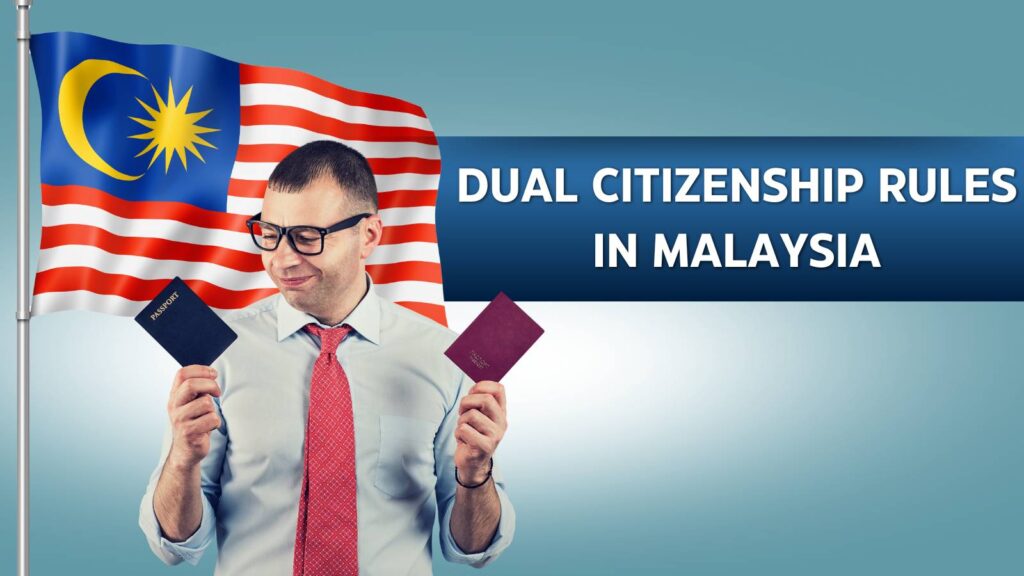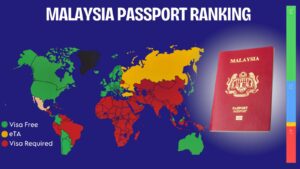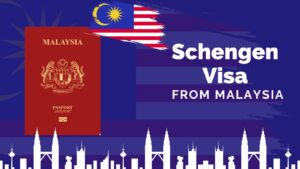Understanding dual citizenship rules Malaysia in 2025 is critical for those navigating this complex landscape. It’s not just about holding two passports; it’s about legal rights, national allegiance, and the future of one’s family and career.
Malaysia Passport Ranking: How Many Countries Can You Travel Visa-Free?
In the age of globalization, mobility is no longer a luxury—it’s a necessity for many. Thousands of Malaysians are now studying in the United Kingdom, working in Canada, starting families in the United States, or building businesses in Australia. These citizens often find themselves in situations where acquiring a second nationality becomes beneficial or even necessary.
Malaysia’s citizenship laws have not evolved as rapidly as the world around it. As a result, many Malaysians are caught in a legal and emotional struggle—balancing the opportunities offered by foreign countries with the risk of losing their Malaysian identity.
Let’s break down what dual citizenship really means in the Malaysian legal context—and what has changed, if anything, in 2025.
Is Dual Citizenship Legal in Malaysia?
The short and direct answer is: No, Malaysia does not officially allow dual citizenship under its Constitution. Article 24 of the Malaysian Federal Constitution strictly prohibits Malaysians from holding the nationality of another country once Malaysian citizenship is granted or retained.
Schengen Visa from Malaysia: Easiest Countries to Apply & Get Approved Fast
This restriction applies regardless of the reason for acquiring another nationality—whether by birth, naturalization, marriage, or other circumstances. However, the interpretation of this rule has often been debated, particularly in cases involving Malaysian children born abroad or those with dual-national parents.
In recent years, discussions have emerged about potential reforms, but as of 2025, dual citizenship rules Malaysia remain firm: a Malaysian cannot voluntarily acquire another citizenship without risking revocation of their Malaysian status.
Who Qualifies for Dual Citizenship in Malaysia 2025?
While the general rule prohibits dual citizenship, there are certain grey areas or exceptions in real-life situations. Let’s explore some of the scenarios where dual nationality becomes a reality—intentionally or unintentionally—for Malaysians.
➤ Malaysians Born Abroad
Children born overseas to Malaysian parents often acquire the nationality of the birth country by default. In countries like the USA, Canada, and Australia, jus soli (right of the soil) applies—meaning these children become citizens of that country upon birth.
In such cases, the child is often recognized as a dual citizen until the age of 21. However, by Malaysian law, they must renounce one of the nationalities upon reaching adulthood. Failing to do so may lead to complications, including potential revocation of Malaysian citizenship.
➤ Children of Mixed-Nationality Parents
A child born to a Malaysian and a foreign national may acquire both nationalities at birth. Again, the Malaysian government expects a decision to be made at the age of maturity—keeping only one nationality. This group continues to be affected by ambiguous and sometimes inconsistent enforcement.
➤ Malaysians Marrying Foreigners
Malaysians who marry foreign nationals may be eligible for foreign citizenship through marriage, depending on the spouse’s country. However, accepting this new nationality voluntarily would result in automatic loss of Malaysian citizenship, according to Article 24(1).
➤ Professionals and Businesspersons Living Abroad
Some Malaysians acquire foreign citizenship for business convenience or long-term residence purposes. However, this step must be taken cautiously. Voluntarily applying for and receiving foreign nationality will lead to automatic revocation of Malaysian citizenship—even if Malaysian documentation remains physically uncollected.
What’s Allowed Under the 2025 Dual Citizenship Framework?
Despite its strict stance, there are some rights and allowances where dual citizenship rules Malaysia permit limited flexibility—particularly in transitional cases or temporary dual status.
➤ Temporary Dual Status for Minors
Malaysia allows children born overseas to hold dual citizenship until they turn 21. For instance, if a Malaysian parent gives birth in a country like the U.S. or Australia, the child automatically gains that country’s citizenship by birth and Malaysian citizenship by descent.
This dual status remains valid during childhood and gives families time to decide where the child will live and which nationality to retain. Once the child reaches 21, they must choose one nationality and formally renounce the other. If they fail to act, Malaysian authorities may automatically revoke their Malaysian citizenship. Families should track this deadline closely and begin the legal process early to avoid complications.
➤ Limited Tolerance in Exceptional Cases
In rare but important cases, Malaysian authorities delay enforcement of citizenship laws—especially when a person acquires dual nationality involuntarily or holds international importance. For example, Malaysians working in humanitarian aid, international diplomacy, science, or global sports may receive temporary tolerance for holding two nationalities.
While this doesn’t legally protect dual citizenship, the government sometimes considers the individual’s contribution to national interest or public image. These cases remain exceptional and require strong justification. If you’re in this situation, seek legal advice and maintain transparency with both Malaysian and foreign authorities.
➤ Travel Privileges During Processing
When Malaysians renounce or switch citizenships, they may temporarily hold two valid passports during the legal transition. This commonly happens while waiting for one country to approve renunciation or grant final approval for citizenship changes.
Malaysian authorities allow this dual document status only if you’ve notified both governments and are actively completing the legal process. During this window, you can use both passports for necessary travel or documentation. However, if you misuse either passport or fail to disclose your dual status, authorities may penalize you or revoke your Malaysian citizenship.
In 2025, Malaysia uses enhanced biometric systems and data sharing to detect dual nationals more efficiently. Make sure you handle all documentation properly and follow timelines to avoid legal trouble.
What’s Not Allowed: Legal Restrictions and Penalties
Malaysia actively enforces its single-citizenship policy through strict legal measures. If you violate the dual citizenship rules Malaysia upholds, you will face serious consequences—ranging from loss of rights to criminal charges.
In 2025, enforcement has become sharper with biometric tracking, cross-border data sharing, and real-time passport monitoring. These advancements leave little room for error or oversight.
➤ You Cannot Use Two Passports at Malaysian Borders
The government strictly prohibits you from using two passports when entering or leaving the country. If you attempt to use a foreign passport alongside your Malaysian one, immigration officers will treat it as an illegal act.
In 2025, Malaysia equipped all major entry points—including KLIA and Johor Bahru—with biometric scanners and facial recognition systems. These tools identify individuals who switch identities at borders. If authorities catch you doing this, they will immediately cancel your Malaysian passport. You may also face fines, criminal prosecution, and even jail time. Repeat offenses can result in a permanent travel ban and loss of citizenship.
By using two passports, you signal dual allegiance—which goes directly against the dual citizenship rules Malaysia enforces.
➤ You Lose Political and Civil Rights When You Accept Another Citizenship
When you voluntarily become a citizen of another country, you instantly lose your Malaysian citizenship. Even if you still carry your MyKad or Malaysian passport, the law no longer considers you a Malaysian.
As a result, you cannot:
- Vote in elections
- Run for public office
- Work in government agencies
- Access certain public benefits or healthcare privileges
If you continue using your Malaysian identity to access these services, the government can charge you with fraud. You risk court action, financial penalties, and blacklisting.
In 2025, Malaysian authorities use international databases to check for dual citizens who illegally retain political rights. If they find your name in a foreign citizenship registry, they will revoke all legal recognition of your Malaysian status without delay.
➤ You Automatically Lose Malaysian Citizenship After Taking Another
The law doesn’t wait for you to notify anyone. The moment you obtain a second citizenship by your own choice—whether through application, marriage, or registration—Malaysia automatically cancels your citizenship. You don’t need to sign anything or appear in court. The system enforces this rule without any appeals or grace periods.
Government officers will:
- Cancel your Malaysian passport
- Remove your name from the national registry
- Refuse you entry into Malaysia as a citizen
In 2025, Malaysia works closely with countries like the U.S., U.K., Canada, and Australia to share citizenship data. If they find out you’ve acquired another nationality, they will act immediately.
Many Malaysians mistakenly believe they can keep dual status quietly. But under the dual citizenship rules Malaysia enforces, discovery leads to automatic and permanent loss of citizenship—no exceptions.
Dual Citizenship vs. Permanent Residency: Key Differences for Malaysians
| Feature | Dual Citizenship | Permanent Residency (PR) |
|---|---|---|
| Legality in Malaysia | ❌ Not allowed under Malaysian law | ✅ Fully allowed and recognized |
| Effect on Malaysian Citizenship | 🚫 Automatically lost upon acquiring another nationality | ✅ Retain Malaysian citizenship while enjoying PR benefits |
| Usage of Malaysian Passport | ❌ Prohibited once dual nationality is discovered | ✅ Continued use without restrictions |
| Civil & Political Rights in Malaysia | ❌ Forfeited once second nationality is taken | ✅ Fully retained while on PR abroad |
| Foreign Work & Residency Rights | ✅ Yes, with foreign citizenship | ✅ Yes, through PR permits |
| Ownership of Property Abroad | ✅ Allowed | ✅ Allowed under most PR schemes |
| Time Abroad | ✅ Unlimited | ✅ Unlimited (though subject to PR renewal rules) |
| Examples of Countries | e.g., USA, UK, Canada (dual citizenship possible but illegal for Malaysians) | e.g., Australia, Canada, Singapore (PR options available) |
| Risk of Losing Malaysian Citizenship | 🔴 Extremely high risk, immediate upon discovery | 🟢 No risk unless foreign citizenship is acquired |
| Best For | Malaysians willing to give up local citizenship | Malaysians seeking global mobility without losing nationality |
FAQs
1. Is dual citizenship allowed in Malaysia in 2025?
No, Malaysia strictly prohibits dual citizenship under Article 24 of its Federal Constitution. Any Malaysian who voluntarily acquires citizenship of another country will automatically lose their Malaysian citizenship.
2. Can Malaysian-born children hold dual citizenship?
Yes, but only temporarily. Children born with dual nationality (e.g., one Malaysian parent and one foreign parent) may hold both until the age of 21. By law, they must choose one nationality before reaching adulthood; failing to do so can result in automatic loss of Malaysian citizenship.
3. What happens if a Malaysian secretly holds dual citizenship?
If authorities discover that you have obtained foreign citizenship without renouncing Malaysian status, you will automatically lose your Malaysian citizenship. This is non-negotiable and does not require a court hearing or notification.
4. Can I apply for permanent residency abroad without losing my Malaysian citizenship?
Yes, you can obtain permanent residency (PR) in another country without violating dual citizenship laws. PR does not involve taking an oath of allegiance or accepting foreign nationality, so you can retain your Malaysian citizenship legally.
5. Are there any exceptions to Malaysia’s dual citizenship ban?
In exceptional humanitarian or national-interest cases, such as when someone offers significant contributions abroad, limited enforcement tolerance may occur. However, these are rare and not considered legal exceptions.
6. What legal consequences do dual citizens face in Malaysia?
Dual citizens caught using two passports or falsely representing themselves as Malaysian may face passport cancellation, criminal charges, fines, or imprisonment. Continued use of MyKad or Malaysian privileges after taking another citizenship is considered fraud.
7. Can I travel on a foreign passport while keeping Malaysian citizenship?
No. If you voluntarily applied for that foreign passport as part of obtaining citizenship, you are no longer considered Malaysian. Any use of that foreign passport for international travel indicates dual allegiance, which is illegal under dual citizenship rules Malaysia enforces.
8. Is there a way to regain Malaysian citizenship after giving it up?
Yes, but it’s extremely difficult. You must apply to the Ministry of Home Affairs, prove strong ties to Malaysia, and meet several conditions. Approval is rare and evaluated on a case-by-case basis.
9. How can I check if I’m still legally a Malaysian citizen?
You can contact the National Registration Department (JPN) or the Ministry of Home Affairs. If your name is removed from the Malaysian citizen registry due to dual citizenship, you are no longer legally recognized as Malaysian.
10. What is the safest alternative to dual citizenship for Malaysians?
Permanent Residency (PR) is the best legal alternative. Countries like Australia, Canada, and Singapore offer PR status that allows Malaysians to live, work, and travel freely without renouncing their original citizenship—keeping them compliant with dual citizenship rules Malaysia maintains.


